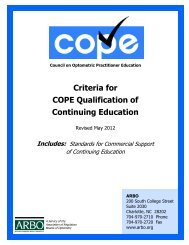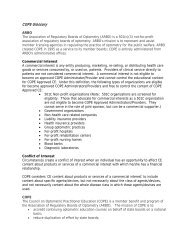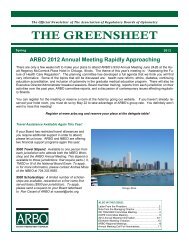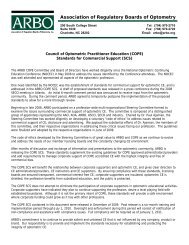WHAT IS COPE? - arbo
WHAT IS COPE? - arbo
WHAT IS COPE? - arbo
You also want an ePaper? Increase the reach of your titles
YUMPU automatically turns print PDFs into web optimized ePapers that Google loves.
GLOSSARY OF <strong>COPE</strong> TERMS<br />
ARBO<br />
The Association of Regulatory Boards of Optometry (ARBO) is a 501(c)(3) not-for-profit association of regulatory<br />
boards of optometry. ARBO's mission is to represent and assist member licensing agencies in regulating the practice of<br />
optometry for the public welfare. ARBO created <strong>COPE</strong> in 1995 as a service to its member boards; <strong>COPE</strong> is entirely administered<br />
from ARBO's administrative offices.<br />
Commercial Interest<br />
A commercial interest is any entity producing, marketing, re-selling, or distributing health care goods or services consumed<br />
by, or used on, patients. Providers of clinical service directly to patients are not considered commercial interest.<br />
A commercial interest is not eligible to become an approved <strong>COPE</strong> Administrator/Provider and cannot control the educational<br />
content for <strong>COPE</strong> Approved CE. Under this definition, the following types of organizations are eligible for become<br />
approved <strong>COPE</strong> Administrators/Providers and free to control the content of <strong>COPE</strong> Approved CE:<br />
� 501C Non-profit organizations (Note: 501C organizations are screened for eligibility. Those that advocate<br />
for commercial interests as a 501C organization are not eligible to become <strong>COPE</strong> Approved Administrators/<br />
Providers. They cannot serve in the role of joint sponsor, but can be a commercial supporter.)<br />
� Government organizations<br />
� Non-health care related companies<br />
� Liability insurance providers<br />
� Health insurance providers<br />
� Group optometric or medical practices<br />
� For-profit hospitals<br />
� For-profit rehabilitation centers<br />
� For-profit nursing homes<br />
� Blood banks<br />
� Diagnostic laboratories<br />
Conflict of Interest<br />
Circumstances create a conflict of interest when an individual has an opportunity to affect CE content about products or<br />
services of a commercial interest with which he/she has a financial relationship.<br />
<strong>COPE</strong> considers ‘CE content about products or services of a commercial interest’ to include content about specific<br />
agents/devices, but not necessarily about the class of agents/devices, and not necessarily content about the whole disease<br />
class in which those agents/devises are used.<br />
<strong>COPE</strong><br />
The Council on Optometric Practitioner Education (<strong>COPE</strong>), a member benefit and program of the Association of Regulatory<br />
Boards of Optometry (ARBO), accredits continuing optometric education on behalf of optometric licensing<br />
boards.<br />
<strong>COPE</strong> Accredited CE<br />
Continuing education activities that consist of <strong>COPE</strong> Qualified Courses produced and delivered by <strong>COPE</strong> Approved Administrators/Providers<br />
within <strong>COPE</strong> Qualified Events.<br />
<strong>COPE</strong> Approved Administrator/Provider<br />
The organization, group, or entity assuming overall responsibility for program planning, promotion, on-site administration,<br />
and financial management of CE events. CE Administrators/Providers must submit an application, agree to abide<br />
by <strong>COPE</strong> rules and regulations and meet specific requirements to become <strong>COPE</strong> Approved Administrators/Providers.<br />
<strong>COPE</strong> Qualified Course<br />
Courses meeting the requirements of <strong>COPE</strong> as determined by the <strong>COPE</strong> Reviewer Process. Qualification of courses is<br />
awarded for a term of three (3) years from the date the statement of qualification is issued by <strong>COPE</strong>. Renewal of Qualification<br />
must occur prior to the conclusion of the qualification period. Courses which are designated <strong>COPE</strong> Qualified<br />
have not met full <strong>COPE</strong> Accreditation. Only when a course is fully accredited will there be guaranteed acceptance by<br />
participating licensing boards as CE for maintenance of licensure.<br />
11






